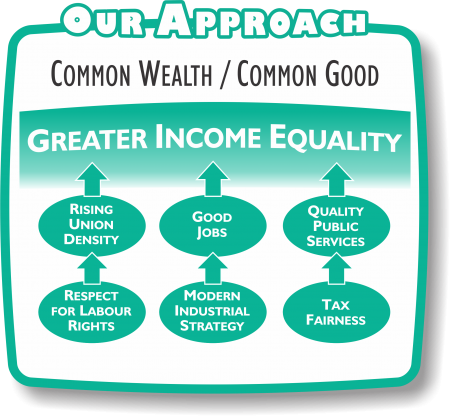GIG BUSTERS
Lonely, unhappy and powerless: there’s a better future for gig workers

Carolyn McDonald, member of the Freelancers Union in the USA
THE TRUTH ABOUT GIGGING IS BRUTAL A deeper truth is that thousands of workers believe that joining or forming unions can make them part of a new truth.
Contrary to popular belief gig workers are not a whole new breed of workers. They are not classless independent actors, glad to be gloriously free from the mundane, mind-numbing drudgery of a 9 to 5 job. They do not feel liberated. They feel lonely, unhappy and powerless.
Yet, the trend to gig work seems bound to continue: a recent startup in Calgary lets homeowners hire snow shovellers using their smartphones; Uber is developing a new shift-work finder app that will match workers to services beyond the ride-sharing industry.
These truths are set out in one of the first scientific studies of gig workers. Three University of Toronto professors* conducted a survey of 2,524 gig and non-gig Canadian workers as part of the 2019 Canadian Quality of Work and Economic Life Study.
Gig work: the “new normal”
The professors asked about paid activities on a per-fee basis, from food delivery and freelancing, to ride-share driving and completing tasks online. They found the gig economy is quickly becoming a central part of Canadian life, with about one in five Canadian workers with gig economy jobs.
The professors found: “Gig economy workers appeared to be suffering compared to more conventional workers.” The professors found gig workers:
- were almost twice as likely to report frequently experiencing a sign of loneliness
- scored higher on a test to measure experiences of anxiety and depression.
The perils of “freedom”
Personal freedom is hailed as the great benefit of gig work. That’s not how gig workers actually feel. What they feel most is powerless.
The professors found:
- gig workers were 50 per cent more likely to report feelings of helplessness, and
- almost 40 per cent more likely to report feelings of little control.
The idea that working in the gig economy gives you a greater degree of personal dignity and self-respect grows into an impossible dream more and more every day.
Uber passengers can now select a “quiet preferred” option, effectively turning drivers into silent chauffeurs.
In-store shoppers become ghosts, working the aisles of grocery stores to fill orders for delivery, often unknown and invisible to their co-workers and shoppers.
In the gig economy, your boss may be an algorithm, and you are subject to the whims of fluctuating demand and a star system that rates every interaction.
A challenge from worker solidarity
The future of the gig economy itself is by no means certain. The ages-old remedy of worker solidarity may yet be its undoing.
A new California law may stunt the growth of the gig work model, or radically restructure it. The law will force many employers to reclassify “app-based” contract workers as employees.
Once workers are recognized as employees they get a clear shot at using the law to exercise their right to join a union and win the kind of control over their worklife gig work never gives.
Something new under the labour sun
Gig-worker solidarity is also on the rise in new organizations that can have the power of unions even though they legally aren’t. The concept has grown to include the 490,000-member Freelancers Union in the USA; in Canada it may soon include the Professionals Canada movement imagined by the 60,000-member Professional Institute of the Public Service of Canada (PIPSC).
Sara Horowitz worked in the labour movement for 18 years. “I was a traditional labour thinker,” she says. Then she started freelancing for her herself. It quickly brought home how precarious freelancing can be. She became convinced it was time for a new form of unionism that would not be constrained by the traditional union link to specific industries; and that would also empower freelancers to “develop their collective identity”. She founded the Freelancers Union in 2003.
The Freelancers Union has grown to be a strong and powerful force for the rights of freelance workers. It offers concrete services and benefits, like affordable health insurance, from what is now their own Freelancers Insurance Company.
Equally important is the strong sense of self-respect, proud identity and solidarity the union gives to an almost unimaginable range of workers, from building cleaners, to nurse practitioners, to lawyers—bound together in solidarity because that's the way they want to be.
“It’s really about creating an environment where all work is valued,” says Horowitz. “Successful freelancers know their value and they stick to it.”
The Freelancers Union is not a union in the traditional sense. Members do not pay dues and the Freelancers Union does not negotiate contracts with employers or intervene when a freelancer has a specific grievance.
The Freelancers Union is a model of the new economy, says Horowitz. It has a core staff of up to 35 employees and a network of freelancers and partners that work on a contractual basis for the union.
A Canadian alternative in the works
PIPSC is in the final stages of deciding whether or not to launch a full-scale effort to form an organization of “independent contractors”—like so many of those created by the federal government’s relentless outsoucing of public service jobs. Such an organization would not be formally structured as a union—but would act like one in almost every other way. PIPSC members approved a 2018 recommendation by their board to spend $1.2 million to explore the possibilities.
The union also sought, and got, the approval of the Canadian Labour Congress to study ways to extend the rights of workers without having them join a union.
If PIPSC creates Professionals Canada, it will target the 3.5 million professionals in Canada working on contracts and in term or temporary jobs. It will look to sell them benefits packages, advice and other services tailored to their specific needs. It will also be a strong public advocate for the labour rights of such professionals and give them a rallying point to build around to become a whole new self-identified community of mutual aid, respect and solidarity.
The proposal is a major departure for PIPSC, which has always been a conservative union that sticks to bread-and-butter issues.
The organization PIPSC imagines would be a first in Canada. However in the UK and Australia unions representing professionals in the public service branched out to represent independent contractors.
* Paul Glavin, from McMaster University; Alex Lieberman, from the University of Calgary; Scott Schieman, from the University of Toronto
- 30 -













Add new comment